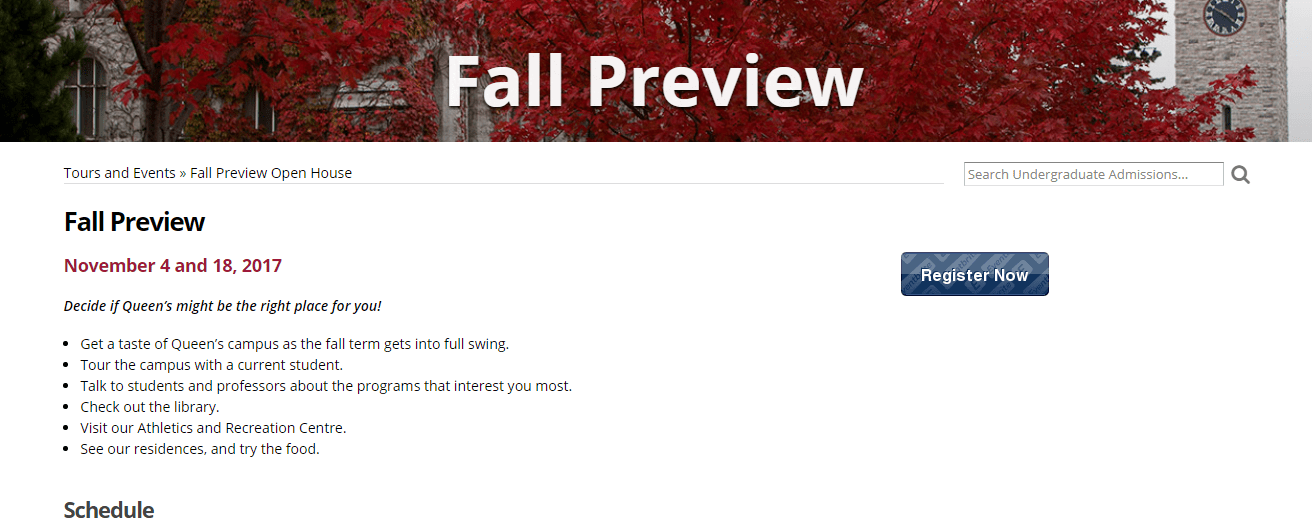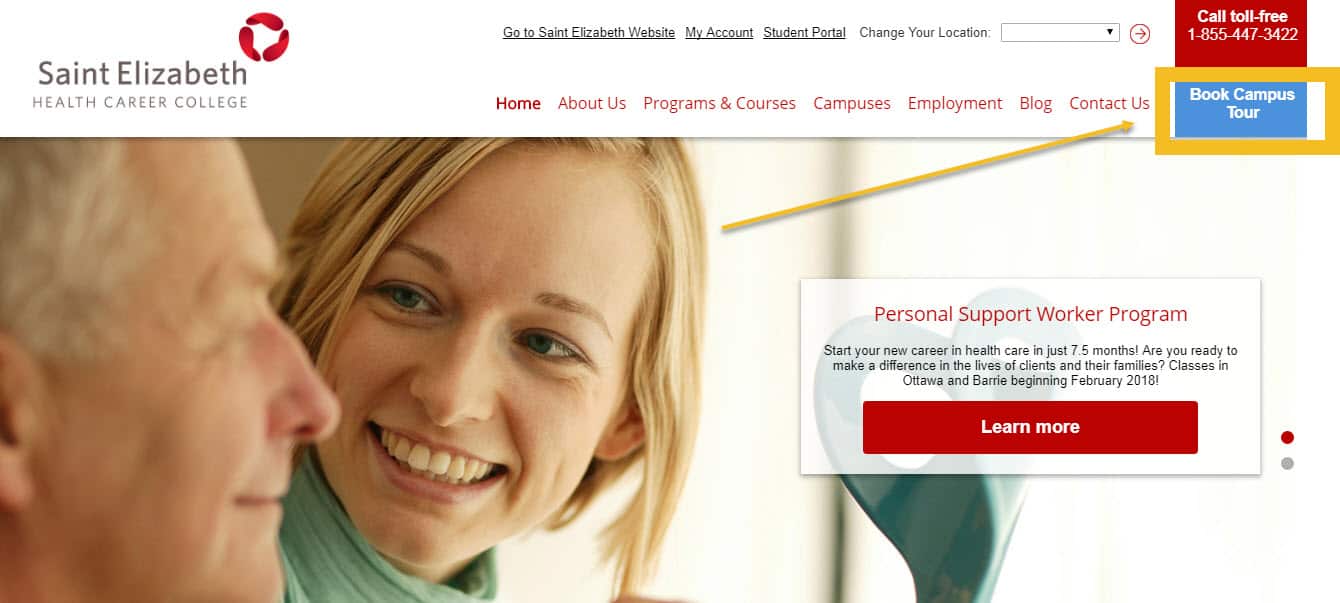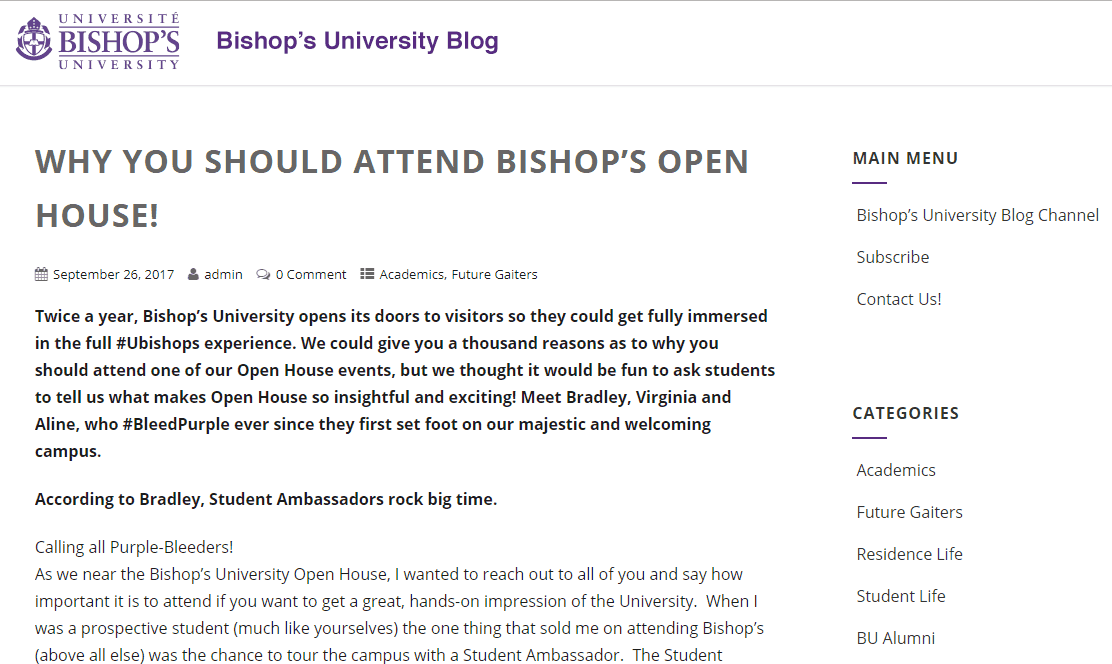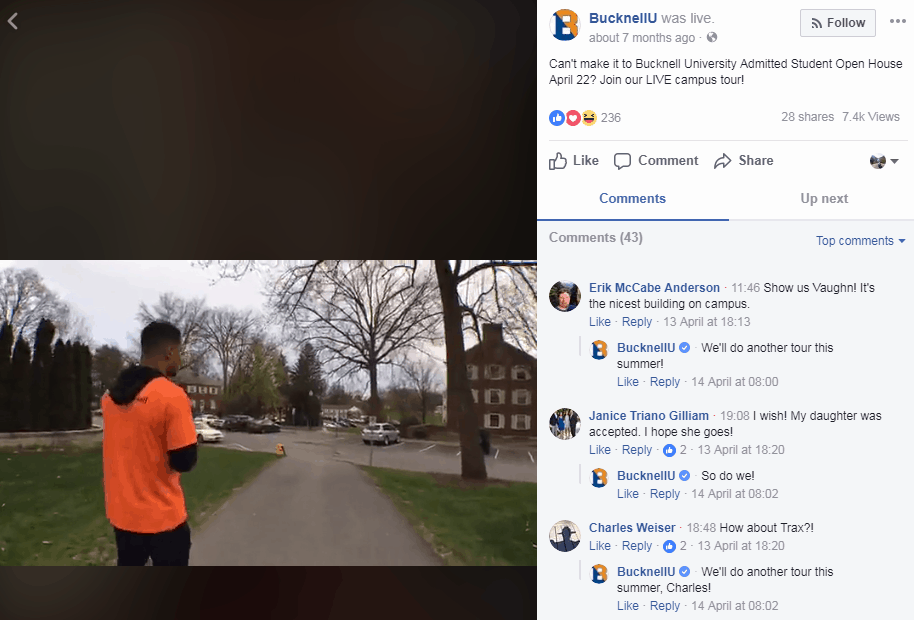
There’s no overstating the importance of establishing an emotional draw between a school and its prospective students. After all, you can try and convince a person of all the reasons why your institution is right for them, but if they don’t feel that it is, and can’t see themselves attending, the effort may not go far.
Hosting open house events, where prospective students can get a firsthand look at your school’s campus, hear about its great programs, and learn more about the unique experience that they can enjoy, is one of the most common ways schools try to address this need.
However, while a great open house can be a very effective way of reaching large groups of high value prospects, the planning and expense that goes into hosting this type of event means it’s important to make sure each one counts. A strong digital marketing campaign can go far in promoting your open houses and ensuring they are the effective drivers of engagement and enrollment that they should be.
Curious about how to get optimal results from your open house events? Here are some simple steps for promoting your open houses online.
1. Promote Open Houses on Your School’s Website
Content development is an ever-important education marketing tool that should be leveraged as part of any open house promotion. Ensuring that you have plenty of informative, relevant, and engaging content on your website will increase the chances of your event getting noticed online, and make it easier for interested prospects to find the details they need.
As a first step, consider creating at least one web page on your site devoted exclusively to the event itself. This should include information about the date, time, location, and other details that will be relevant to would-be attendees. If you have a more general “Events” page where your institution lists upcoming events and functions, be sure to list the open house and provide a link to the dedicated web page there, too.
Example: Queen’s University has a dedicated web page for its “Fall Preview” open house, complete with information about the event and a call-to-action button inviting prospects to register.

You should ensure that any unique web pages you create for your open house make it easy for prospective students to register to attend. Preferably, you should include a short registration form within the page itself. An effective, eye-catching CTA will also go a long way towards pushing leads towards conversion. To amplify the reach of your page, it might also be worthwhile to place specially designed CTAs promoting the event on other pages of your site, to encourage casual visitors to register.
Example: Saint Elizabeth Health Career College features a CTA inviting prospective students to book a campus tour on all of its web pages.

An upcoming open house is also a great opportunity to create targeted content on your school’s blog or news pages. A blog post highlighting things visitors can expect at the open house could be a great way to expand a little on what will be offered, and can use a looser tone than the main event web page. This can also be a great place to share images or video from previous open houses and give curious prospective students a taste of what they can look forward to.
Example: Bishop’s University used a blog post to tell visitors all about the open house experience.

2. Promote the Open House on Social Media
Because of its powerful functionality and reach potential, social media should be a cornerstone of any successful education marketing strategy for open house events. For most institutions, Facebook will be a top priority channel for spreading awareness of your event and encouraging prospective students to sign up. This should begin with the preliminary step of creating a Facebook Event for the open house, which can serve as a hub for informing prospects about the event’s pertinent details, and provide a space for interested parties to interact with your school.
Once this page is up and running, investing some resources in paid promotion is a great way to help it build momentum. This can be done by “boosting” the event itself, which results in a simple ad being created for the event, and by creating specific event ads. Event ads offer more opportunity for customization, allowing you to choose from multimedia options like slideshows, videos, and other attractive visuals to put front and centre in your ad.
Employing both approaches can help put your event in front of many more eyes, drawing greater attention to it. Facebook Ads also gives you the opportunity to target users by location, age, gender, or a number of other parameters, making it easier to maximize its effectiveness. Your school could also consider creating a remarketing campaign to target prospective students who have already shown an interest in your school.
Generally speaking, a good timeline for beginning your social media advertising efforts is two weeks prior to the open house date – long enough to have plenty of opportunity to appeal to people, but not so long that prospects forget about the impending event.
Example: This open house Facebook ad from Living Arts College combines eye-catching visuals with plenty of practical information and details about the event.

You should aim to promote your open house across other social media channels too, and there are a number of fun ways to go about it. Posting reminders about the open house, linking to your open house web page and Facebook event page, and sharing any related content across platforms like Twitter, LinkedIn, and Instagram in the weeks leading up to the event can increase your chances of attracting seriously interested prospects. You can also promote your open house through more niche sites like Tumblr and Pinterest as well.
If you have the resources, you could also consider investing in the creation of a video ad for the open house. This might involve footage from previous events, or just show off your vibrant campus and community, along with relevant scheduling info and directions on how viewers can learn more about the event. This type of video is ripe for sharing across all social media channels, including in your ads, Facebook event page, YouTube, and more.
Example: St. John’s University created a short, nicely edited video advertising its open house event.

Finally, it’s also worthwhile to change the cover image of your social media accounts to include information on your open house, as well as the date, time, and location of the event. Saturating your social media presence in this manner is a great way to show off how excited your institution is about the upcoming event, and every little bit can help in getting prospects informed and energized about it.
Example: During the weeks preceding their event, Living Arts College changed their Facebook cover image to raise awareness of their open house.

Also, don’t forget to be extra responsive to posts, comments, and messages on your social accounts during this time. Prospective students who have a great interactive experience with you will be more likely to be motivated to show up!
3. Create Email Marketing Campaigns for Your Open Houses
When marketing an open house, it’s important to make sure existing leads who have already expressed interest in your school are informed about the event. Employing an email marketing campaign to speak to these individuals is an excellent way to do this, allowing your team to gently encourage them to attend, and to follow up on their interest afterwards.
To cut down on your team’s workload and ensure appropriate messaging to each individual student, it’s worth considering automating this process. A good customer relationship management (CRM) platform, such as Hubspot, will include email automation as a part of its functionality, and dedicated email marketing applications like MailChimp are also built around this concept.
Using these tools, you can establish email workflows which lay out sequences of messaging that are to be followed for addressing distinct populations within your mailing list. When doing email marketing for your open house, you’ll also want to ensure you have created separate workflows for those who have confirmed attendance, and those who haven’t.
Here’s an example of a simple workflow plan that would work well for promoting an Open House via email:

In this example, every prospect receives the same invitation. Afterwards, the messages differ based on the actions undertaken by the receiver. If a prospect clicks a link in the email confirming they will attend the open house, the system can be set up so that the prospect receives a confirmation email thanking them for doing so, and then a reminder to attend the week of the event.
A prospect who does not confirm, on the other hand, would get a different reminder email in the week prior to the open house, letting them know that it’s not too late to sign up to attend. Segmenting prospective attendees in this way ensures that everyone gets a message that feels personalized to their particular status – an important way to make prospects feel like your school is paying attention, and values them.
4. Complement Your Online Education Marketing Efforts With Phone Follow-Up
Open houses can be a great way to generate seriously interested, high-value leads for your school, so following up with them effectively should be a priority for your team both before and after the event. Automated email messaging can and should be a part of this effort. In addition, having members of your team take the time to make personal phone calls to prospects is also important. Complementing your online efforts in this way can help establish a more personal connection with your leads, and also allows you to immediately address any questions or concerns they might have regarding the open house or enrollment.
Prior to the event, callers should be prepared to share important logistical information about the open house, as well as provide a tantalizing idea of the kinds of activities or experiences prospects can expect from the event. The call may also provide a valuable opportunity to find out more about an individual prospective student’s interest in your school, what programs they are considering, and what barriers to enrollment they face.
Following up after the event is just as important as doing so prior to it. It offers the opportunity to build upon the excitement of the open house, and to answer any new questions that may have arisen. It can be one of your best chances to solidify a prospect’s interest and encourage them to make an application, especially if you have touched base with them by phone before the event and established a rapport. As with pre-event lead follow-up, leads should receive both an email and a telephone call to ensure they are well taken care of.
5. Use Same-Day Promotion to Bring Your Event to a Wider Audience
While the day of your open house might be a bit too late to significantly bolster the number of attendees, there are still a number of things you can do online to extend the event’s reach and impact, and create additional value for prospective students.
One of the most impactful moves you can make is to arrange for live streams of different activities taking place at your open house, which can be broadcast online throughout the day. Streaming a campus tour, select lectures, or information sessions can help deliver the experience to prospective students who are unable to make it to the event itself. This opportunity can be particularly important for international students, who are often unable to attend these kinds of events prior to making an application to your school.
Example: Bucknell University offered a live campus tour for students unable to attend its open house.

Live streams can be valuable engagement tools for students who can’t be there on the day. You should encourage viewers to ask questions in the comments section, and have a member of your team monitoring the feed to ensure their queries are answered promptly.
A stream can be done through multiple avenues, including your own website, but broadcasting through Facebook Live may be the best option, due to the real-time analysis of viewer metrics the tool offers. This will allow you to see important information like the peak number of live viewers, the total number of viewers, and the number of minutes viewed. Both during your broadcast and later on, this information can give you an indication of how effective your stream was at retaining attention. Performance that doesn’t quite match what you were hoping for can be an indication that a new stylistic approach could be worthwhile next time, or that the stream needed more promotion to attract a larger audience.
And, of course, don’t forget that live streams can be recorded and re-shared across platforms later on. Invest in a quality live stream of your open house and you can acquire a piece of valuable, informative web content that can be redistributed for weeks or months to come.
Another good same-day tactic is to document the open house on social media, as it happens. Posting live updates, along with images or snippets of video, can be a great way to highlight important or interesting moments for both attendees and your off-site audience.
Example: Ryerson University posted a fun little update to Twitter announcing its open house and inviting its student body to participate in welcoming prospects.

If you decide to run a live stream, it’s also a good idea to throw in a few plugs for the stream in the midst of your social media posts that day, just to give it a boost. The greatest use of social media on the day of the event, though, comes in the form of audience participation. Encouraging attendees of the open house to share their thoughts, or photos capturing favourite moments or sights, can help create a higher-energy, participatory atmosphere that gets prospects more excited about the idea of attending your school. Creating an event-specific hashtag and encouraging participants to use it when sharing their own posts can help you monitor social media for activity relating to your open house, and get an idea of how visitors are reacting to the event.
Not only will this help your event gain real traction on the web, but it will provide your school with a wealth of user-generated content which can be repurposed and reshared across your digital marketing channels.
Example: The University of Reading regularly encourages prospective students to share posts about their open house events using their #UofRStartHere hashtag. They often repurpose the collected content on their website using Storify, a great example of the lasting value these kinds of posts offer.

6. Measure the Success of Your Education Marketing Efforts After Open Houses
After staging a successful open house event, it’s time to move on to the next one – and in order to continuously improve your promotional efforts, it’s important that you have tangible means to measure the success of your initiatives.
Google Analytics can be extremely valuable for this, providing you with great, quantified data about the success of your event and your efforts to promote it online. Creating a specific campaign for your open house within your GA setup and setting Goals around your associated marketing efforts will allow you to evaluate which channels were the most effective, and which ones might have strategies in need of rethinking ahead of future events.
If you use a CRM system, it is also advisable to create an open house campaign within it for your event. This will allow you to gain even more specific data on elements of your campaigns such as website visits, form submissions, and email open rates. Tracking the specific data of leads generated through your open house campaigns will also give you a clearer view of how successful the event was in attracting qualified prospective students, and pushing them towards enrollment.
Note that for both Google Analytics and CRM, establishing proper, accurate attribution is key. If campaigns and tracking codes are not properly configured prior to beginning your open house campaigns, the acquired data will likely be skewed, and may not be entirely accurate.
With so many different tools at your disposal, it’s easy to come at an open house event from many angles, and ensure your education marketing strategies cover a good number of bases en route to attracting a huge crowd. Applying the tips above will help ensure that you do so efficiently, and that you can achieve optimal results.






